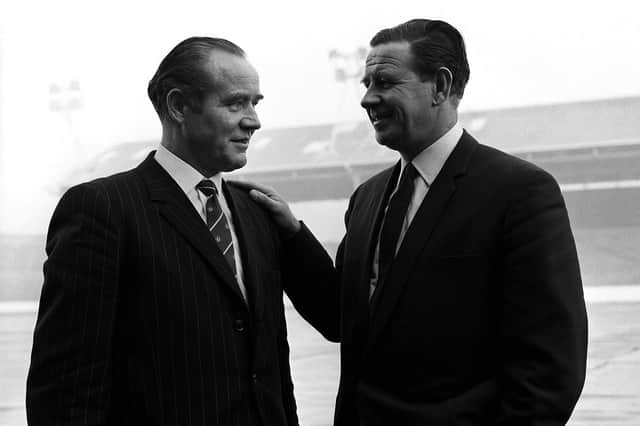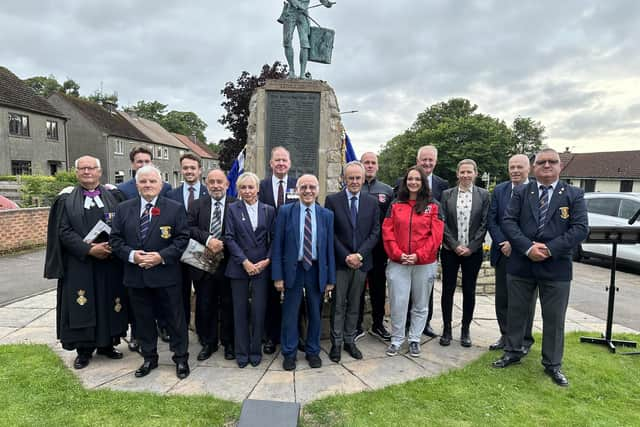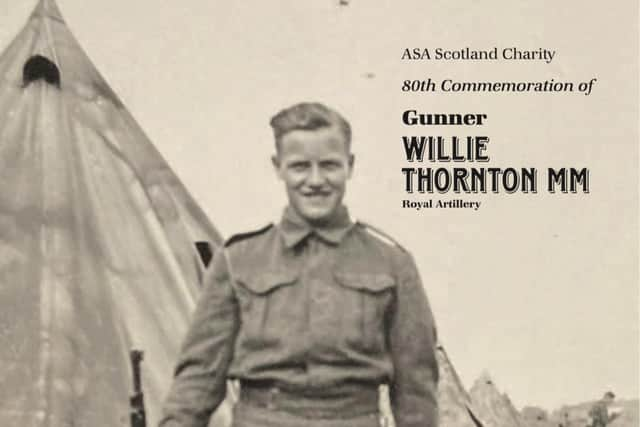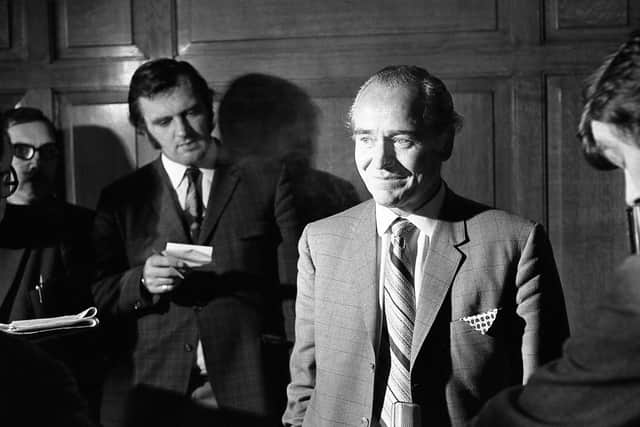Remembering legend of Willie Thornton: Rangers great not forgotten at Ibrox but event aims to reconnect war hero to Winchburgh hometown


Rangers icon Willie Thornton might well have said that the greatest blessing bestowed upon him was that he was not among them. As in the case of nearly every settlement in Britain, the West Lothian town suffered losses. It was a near miracle that Thornton did not join the likes of Private William Murray and Sergeant Hugh King on the plaque.
Although his eventual death, at the age of 71 in August 1991, was described as untimely, Thornton, who signed for Rangers in 1936, was granted long enough to spend a further eight seasons at the club after he returned from the war. He scored many more significant goals, including the winner in the Scottish Cup final against Morton in 1948. The forward also netted twice in the 3-0 win over East Fife when the Ibrox side won the trophy for the third time in succession two years later.
Advertisement
Hide AdAdvertisement
Hide AdAll well and good, of course. But Thornton had already taken possession of the most important medal of his life. It was sent with an apology from a king.


In the final hours of July 1943, as night bled into day, he displayed a different kind of composure to that required for scoring goals. In the Sferro Hills of Sicily while under sustained bombardment from enemy fire, 586278 Gunner Thornton accompanied his Battery Commander at an observation post on Point 22.
As his citation recorded, “he passed down Fire Orders under heavy shelling and mortar fire”. He was one of only nineteen members of his regiment, the 80th (Scottish Horse) Regiment of the Royal Artillery, to receive a Military Medal during the Second World War.
As he was on active service abroad, Thornton did not receive his award in person from King George VI. It was sent instead by post, with a personal letter of apology from the King. Like many Scottish clubs, Rangers have a number of war heroes, including defender Harold Davis, who recovered from devastating injuries in Korea to star for the club, but Thornton remains the only Ibrox player to have earned this honour.
A commemoration of the award took place beneath grey skies on Tuesday night near a road junction in the centre of Winchburgh, Thornton's hometown. It was the first day of August, 80 years to the day since he played such a crucial part while the shells rained down in a key battle in the liberation of Sicily.


It was more becalmed earlier this week in Winchburgh. At times the noise from the passing evening traffic did drown out the sound of speeches, prayers and music, including Highland Cathedral, during a short but poignant service led by the Reverend Stephen Blakey. Life goes on in this former mining community, as it has gone on since Thornton left the area to sign for Rangers, aged just 16.
Thornton’s daughter, Lynn Thornton Campbell, was present on a rare trip back to her father’s hometown, as were the two grandsons, Colin and Iain, he never met. Colin, the eldest, was born nine months after his grandfather's death. They grew up where their mother had grown up, in the family home in Bearsden.
Lynn, however, was born in Broughty Ferry. In that detail itself can be traced another step in Thornton's hugely influential football career; he managed Dundee between 1954 and 1959. He is credited with laying the foundations of the Dens Park club’s Scottish title-winning side of 1962. He handed debuts to Alan Gilzean, Ian Ure, Andy Penman and Bobby Cox, who went on to captain that great team.
Advertisement
Hide AdAdvertisement
Hide AdSporting a replica of her father’s Military Medal on her lapel, Lynn recalled growing up as the only child of a football legend and war hero. “My Dad moved up to Dundee in 1954,” she said. “I was born in '56. We move back down to Bearsden in '59. My mum hated it! She loved the Ferry, and being able to go down to the water!


"In '67 it was back to Rangers, and that was him for the rest of his days. His happy story is that he is the only Rangers manager to have a 100 per record because, after they sacked David White, he was caretaker for two matches and they won both of them.
"Then Willie Waddell came in, and he was assistant to his lifelong friend. He also enjoyed lifelong friendships with Bob McPhail, who took him under his wing at 16, Torry Gillick, Willie Woodburn, Bobby Brown, Ian McColl.... They were like uncles to me.”
Thornton represented a father figure to many, including legendary winger Willie Henderson, another attendee at the event. Now 79, he recalled the impact someone he still refers to as “Mr Thornton” had on him.
“When I joined Rangers, as a young boy, just 15 or 16, he was one of the people who was there,” he told me. “He was always a person who wanted to help you if you were not doing it right. He would give you a wee pat on the back – ‘C’mon son!’ - rather than the other way. It was a pleasure working under him. Hence the reason I am standing here today.”
Others were eager to attend, including a collection of boys and girls from Winchburgh Albion FC, the club for whom Thornton played before joining Rangers, initially for £1 a week. Aged 16 years and 312 days, he remains the Ibrox club's youngest-ever goalscorer – against Arbroath in 1937. He struck another 237 times in all competitions for Rangers, which is verging on Ally McCoist-territory. He earned seven Scottish caps.
One aim of Tuesday night’s event was re-connecting the local community to the legend of Thornton. Of course, there’s not a chance that Rangers will forget his worth. Along with the Blue Room and the trophy room, the Thornton Suite is one of the most well-appointed areas inside Ibrox, rightly so.
Thornton managed Partick Thistle for eight years when he left Dundee. But he returned to his first love Rangers as an assistant to Willie Waddell, with whom he struck up such a productive partnership as a player under Bill Struth.
Advertisement
Hide AdAdvertisement
Hide AdThornton later became a keeper of the Ibrox flame and was still making daily appearances at the club in the late 1980s as curator of the trophy room. “He was the first main ambassador for the club I would say,” said Rangers historian David Mason, who was present on Tuesday.
The regard in which he is, or isn't, held by Winchburgh informed this week’s proceedings, which were organised by the Ancre Somme Association Scotland charity (ASA). There is a move to re-name Craigton Park, where Winchburgh Albion play, after him. Ideally, sufficient funds would be found to erect a statue.
“Obviously Willie Thornton was very well known in the footballing fraternity but looking at Winchburgh, a reasonably small place, how many people would know him, and know about his exploits during the war?” wondered ASA Scotland president, William Buchanan.
“Time has moved on,” he added. “There are a lot of new houses in Winchburgh. People don’t know. To me it is an important issue. It should be recorded. Young people in Winchburgh might now be saying: ‘Who is Willie Thornton?’”
Who he was is perhaps best summed up by Lynn, who ended a short, emotional speech, with these words: “He was a hero, but he was always my hero.”
Those wishing to donate towards a memorial for Willie Thornton in Winchburgh can do so at https://asascotland.enthuse.com/cf/willie-thornton-mm
Comments
Want to join the conversation? Please or to comment on this article.